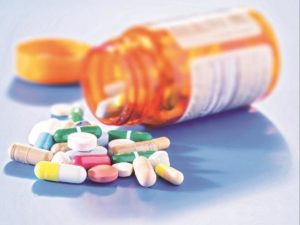
Ukraine has registered 623 new cases of COVID-19, as well as 589 recoveries and 20 deaths in the past 24 hours, the Ukrainian Health Ministry said.
“Ukraine recorded 623 new cases of COVID-19 [including 37 children and 12 medical workers] over the past day, July 14, 2021. In the past 24 hours, 387 persons were hospitalized, 20 died, and 589 recovered,” the ministry said on Telegram on Thursday morning.
Since the beginning of the coronavirus pandemic, Ukraine has seen a total of 2.243 million cases of COVID-19, including 2.180 million recoveries and 52,685 deaths.
Over the past day, the majority of cases were registered in Kyiv (177), Odesa region (57), Zhytomyr region (33), Donetsk region (32), and Kyiv region (31).
According to the Health Ministry, a coronavirus vaccine was received by 108,759 people in Ukraine over the past day, July 14, including 61,580 persons who received the first shot of vaccine and 47,179 who completed their vaccination.
“As many as 108,759 persons were vaccinated for COVID-19 over the past day, July 14, 2021. The first shot was received by 61,580 persons, while 47,179 persons completed their vaccination,” the ministry said on Telegram.
“Since the beginning of the vaccination process, 2.476.634 persons have received the vaccine, including 2.476.632 who received their first shot and 1.305.882 who received both doses [including two persons who received their first shot abroad]. A total of 3.782.514 shots have been administered to date,” the ministry said.

Minister of Finance Serhiy Marchenko criticized head of the Ministry of Health Maksym Stepanov for poor planning of measures to combat COVID-19, while admitting the possibility of increasing spending on medicine in the state budget-2021.
“He behaves like a character from ’12 Chairs’. ‘Money in the morning – chairs in the evening, money in the evening – chairs in the morning, but money in advance.’ That’s how Stepanov behaves. His task is to get as much of a budget as possible, taking advantage of the fact that we have a COVID, we have problems, we have people dying, and then, using this rhetoric, to solve those problems that are necessary to solve. I think this is absolutely wrong,” Marchenko said in an interview with lb.ua.
“We must first propose a plan, show a solution to the problem, and there was enough time for that, and then ask the finance minister or the government questions to search for funds. And now we have the approach – first money, and then I will fight COVID-19. It is impossible to put the question like that,” the minister said.
At the same time, the head of the Ministry of Finance pointed to the unspent funds of the Fund to Combat COVID-19 at the end of 2020.
“At the Cabinet of Ministers we often sort things out, and this is normal, because I have something to ask him, in particular, about the leftovers of last year. He collected money, and in the end we got leftovers that were not used,” Marchenko said.
Speaking about the possibility of correction of the state budget for 2021, he also said there is a possibility of increasing spending on medicine.
“There is a possibility of such a scenario, since there is a need to close several issues on medicine. We will discuss with the IMF and with other partners the possibility of minor adjustments to the budget,” Marchenko said.

The list of specialized organizations that will procure medicines and medical products in 2021 was approved by the government at the Wednesday meeting.
According to the document, the Crown Agents British purchasing agency will procure: tests, consumables for the diagnosis of tuberculosis; immunobiological medicines for immunoprophylaxis of the population and products to ensure control of immunobiological preparations and medical devices; medicines for children with dwarfism of various origins; medical products for citizens suffering from epidermolysis bullosa; medicines for patients in the pre- and postoperative period of transplantation; consumables for determining the level of glucose in the blood, glycated hemoglobin; medicines for children with mental and behavioral disorders from the autism spectrum, with schizophrenia, affective disorders, hyperkinetic disorders and epilepsy; endoprostheses and implantation kits.
The United Nations Development Program (UNDP) will procure: medicines for citizens with viral hepatitis B and C; test systems for diagnosing HIV infection, accompanying antiretroviral therapy and monitoring the course of HIV infection in patients, determining the resistance of the virus, conducting reference studies; medicines and medical products to ensure the development of donation of blood and its components.

Executive Director of the Ukrainian Institute of Politics Mykola Spyrydonov has said that healthcare reform creates numerous problems with medical assistance for the population. He expressed such opinion during a discussion of a sociology survey conducted by Active Group, which was presented jointly with the Expert Club on June 22, 2020 at the press center of the Interfax-Ukraine News Agency.
“Even now, when ambulance arrives on call to take care of a child, the doctors in fact cannot do anything if the contract with a family doctor is not signed. If the contract is signed, the person is in fact a bondman,” the political expert said in a recent video on the Expert Club YouTube channel.
Therefore, according to Spyrydonov, the bureaucratic system does not allow people to receive medical services in the needed amount and in fact force them to go to private clinics.
“In fact, we are witnessing the process of destroying medicine, hindering the population from receiving medical services. Moreover, the number of hospitals and medical personnel is being reduced, thus creating additional hardships for receiving medical assistance,” the expert said.
According to the opinion poll, some 50% of Ukrainians said that the country’s healthcare system has become worse in general since the introduction of lockdown restrictions, while 22% respondents said that medical services have slightly improved, and only 3% said that they have significantly worsened.
The full video is available on the Expert Club YouTube channel:
EXPERT, EXPERT CLUB, EXPERT KITCHEN, HEALTHCARE REFORM, MEDICINE, SPYRYDONOV

PJSC Farmak pharmaceutical company (Kyiv) will use the German scientists’ protocol of clinical trials of the antiviral medicine efficiency, produced by Farmak for coronavirus (COVID-19) treatment, the company’s press service said with reference to Chairperson of the Supervisory Board of Farmak Filya Zhebrovska.
“This medicine was tested apart from human trials and showed good results. We need to come to clinical trials and conduct them, so that in the autumn we know that this medicine is effective and it can fight COVID-19. German scientists helped us indeed. They have prepared the clinical trial protocol correctly, so that we can investigate if this medicine is working according to all necessary criteria. This is a big, hard and expensive work,” she said.
Zhebrovska said that the antiviral medicine, which efficiency against COVID-19 Farmak plans to test, is also being studied by foreign research centers.
“There are good studies on our antiviral medicine at Oxford and Frankfurt universities,” she said.
Zhebrovska said that significant financial funds are needed for the development of COVID-19 vaccines, which Ukraine and the Ukrainian pharmaceutical companies do not currently have.
“The European Investment Bank organized a consortium together with the WHO and allocated EUR 7.6 billion for the development of vaccines for COVID-19. Neither Farmak, nor Ukraine, unfortunately, have such financial capacities. Perhaps we can join to these works at some stage,” she said.
Farmak is the leader in the pharmaceutical market of Ukraine in terms of sales. It exports products to 20 countries.

The affordable price becomes the important criterion for choosing effective medicines, Indian Ambassador to Ukraine Partha Satpathy has said.
“Today, the low price offered for an effective and high-quality drug is becoming a very important criterion for choosing medicines. Leading Indian pharmaceutical companies introduce medicines manufactured at modern production sites, taking into account the laws of countries with Stringent Regulatory Authorities, the requirements of EU regulatory agencies and the FDA, to the Ukrainian market,” he said during the third annual business seminar entitled “India – a Global Force in Pharmaceuticals, a Reliable Partner for Ukraine” organized by the Indian Pharmaceutical Manufacturers’ Association (IPMA) in cooperation with the Embassy of India in Ukraine last week in Kyiv.
The ambassador said that the government of India has determined the production of effective and affordable medicines, which the country can provide not only with the needs of the domestic market, but also with export, as one of the directions of state policy.
“The Indian pharmaceutical industry is so successful that it is capable to satisfy the needs of not only the domestic market of India, but the whole world. These needs are met on the basis of two principles: the availability of medicines and their reasonable price. Indeed, the health of many people depends on the availability of efficiency and the price of medicines,” he said.
Satpathy recalled that “the Indian government has taken certain steps: it has identified priority medicines, encouraged the manufacturing companies of these medicines and determined the basis for the implementation of the state regulatory policy to ensure the quality and effectiveness of medicines.”
The ambassador also said that Indian medicines can play a significant role in the implementation of the government’s Affordable Medicines program in Ukraine.
“It is high-quality medicines at a reasonable price that play an important role in this program. Therefore, the Indian side can be useful in this direction,” he said.
In addition, Satpathy noted the potential of Indian pharmaceutical companies in the segment of vaccines, oncology and drugs for the treatment of cardiovascular diseases for the entire world, as well as in the production of innovative medicines.
According to Proxima Research, in January-October 2019, 41.3 million packages of Indian medicines were sold on the retail market of Ukraine for a total of UAH 4.369 billion, which is 6.3% in cash and 4.6% in kind of the entire retail pharmaceutical market of Ukraine.
In turn, IPMA President Dr. Menon Ramanan Unni Parambath emphasized the willingness of leading Indian manufacturers to provide Ukrainian patients with a wide range of effective and high-quality medications at affordable prices.
For his part, Deputy Minister of Health of Ukraine Dmytro Koval said that the quality of registered Indian drugs is in line with international standards, and leading health experts acknowledge this.
According to the data announced during the seminar, the top 10 in terms of sales in the Ukrainian retail market among Indian companies in January-October 2019included, in particular, Dr. Reddy’s Laboratories Ltd. (UAH 632.078 million or 5.392 million packages), Organosyn Life Sciences (UAH 460.279 million), Abryl Formulations (UAH 268.204 million), Sun Pharma (UAH 216.326 million), Euro Lifecare (UAH 188.365 million) and Macleods Pharmaceuticals (UAH 157.947 million). They are members of IPMA.